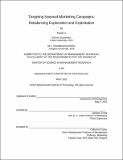Targeting Seasonal Marketing Campaigns: Rebalancing Exploration and Exploitation
Author(s)
Li, Keyan
DownloadThesis PDF (865.5Kb)
Advisor
Zhang, Juanjuan
Terms of use
Metadata
Show full item recordAbstract
Once a firm has a targeting policy, the firm incurs an opportunity cost when varying its action to learn how to improve that policy. This results in what is classically considered an exploration vs. exploitation tradeoff. This tradeoff is widely studied in online learning domains. However, firms are forced to learn in batches that occur infrequently in many marketing channels, such as seasonal marketing campaigns and salesperson marketing. For example, when demand is seasonal, marketing campaigns often occur annually, with retailers using data from last year to train this year’s policy. This essay identifies an information externality when assigning actions to customers in the same batch: the incremental information contributed by the focal customer depends upon the assignment decisions foe other customers. This essay investigates how to optimally rebalance exploration (more variation) and exploitation (direct implementation) in these settings leveraging this externality. The algorithm this essay proposes balances the expected value and opportunity cost of new information from each new batch. This essay validates the findings using data from a field experiment.¹
¹This essay is based on joint work with Duncan Simester.
Date issued
2022-05Department
Sloan School of ManagementPublisher
Massachusetts Institute of Technology